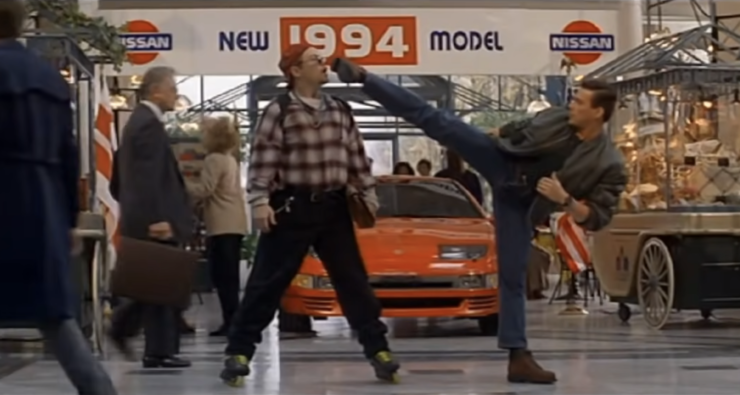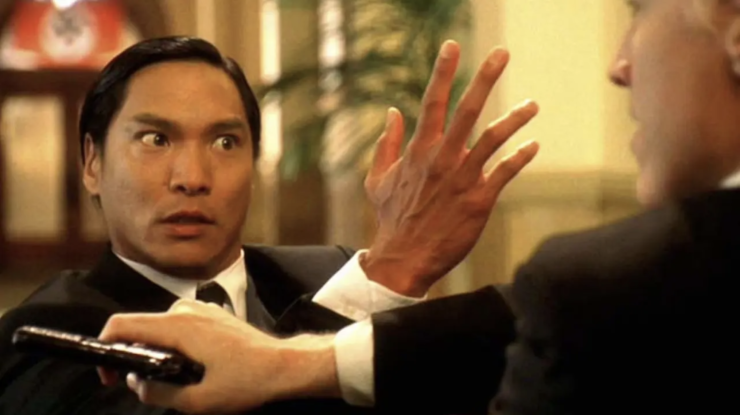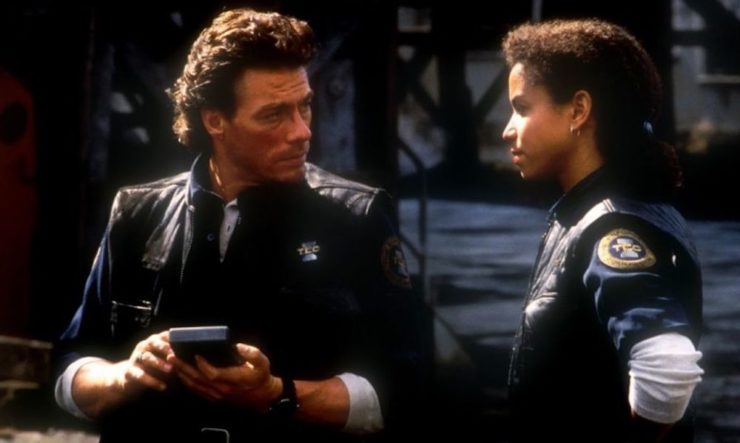From August 2017 – January 2020, Keith R.A. DeCandido took a weekly look at every live-action movie based on a superhero comic that had been made to date in the weekly Superhero Movie Rewatch. He has been revisiting the feature every six months or so to look back at the new releases in the previous half-year, as well as a few he missed the first time through. After doing two 1970s gems, It’s a Bird… It’s a Plane… It’s Superman! and Mandrake, we continue this week with the two Timecop movies before getting into the newer stuff.
Dark Horse Comics has two track records of note in its time being one of the bigger tiny fish that live in the shadow of the Big Two of comics-dom, Marvel and DC. One is their use of anthology series, including Dark Horse Presents and Dark Horse Comics, as a launching pad for storylines. (Sin City, Concrete, and several other of their hit comics got started in DHP.) The other is their relationship with the film industry, which has produced several films we’ve seen in this rewatch: Barb Wire, The Mask, Mystery Men, the Hellboy movies, Sin City, R.I.P.D.
Timecop checks both those boxes.
The story “Time Cop: A Man Out of Time” by Mark Richardson, Mark Verheiden, and Ron Randall appeared in three issues of the anthology Dark Horse Comics in 1992. It was about a cop named Max Walker who works for the Time Enforcement Commission to stop people from going back in time and changing history.
The movie that was released two years later and starred kickboxer-turned-actor Jean-Claude Van Damme was also written by Richardson and Verheiden, making it only the third movie in this rewatch (along with Sin City: A Dame to Kill For and The Old Guard) where the writing credits of both the comics and the movie adaptation are exact matches.
This would normally bespeak fidelity to the source material, but where “Time Cop: A Man Out of Time” is about Walker stopping a criminal from stealing diamonds from a 1930s South African mine, Timecop is about Walker dueling with a senator named McComb (played by Ron Silver) who is using time-travel technology to acquire money for his presidential campaign. The movie uses several time periods, but mostly takes place in either 1994 (when the TEC is just starting) and 2004 (the year from which McComb is engaging in his campaign).
Buy the Book


Drunk on All Your Strange New Words
Like many theatrical releases in the waning days of the twentieth century and early days of the twenty-first, Timecop had a direct-to-home-video sequel that had an entirely different cast (see also Son of the Mask). Keeping the theme of a star with a martial arts background, they hired Jason Scott Lee as the lead, though Lee was an actor first. Where Van Damme was a martial artist who wanted to become an actor, Lee didn’t start training until he landed the role of Bruce Lee in Dragon: The Bruce Lee Story, though he continued to train in Lee’s art of Jeet Kune Do, becoming a certified instructor in the discipline. Timecop: The Berlin Decision was released in 2003 and took place in 2025, the passage of time accounting for the all-new cast.
Both movies feature oh-that-guy actors you’ve seen in lots of other, better movies and TV shows: Mia Sara (Ferris Bueller’s Day Off), Bruce McGill (Animal House), and Gloria Reuben (ER) in Timecop, Thomas Ian Griffith (The Karate Kid III and Cobra Kai), A.J. Buckley (CSI: NY), and John Beck (Dallas) in The Berlin Decision. Plus several Vancouver-based actors that you’ve probably seen in dozens of TV shows and movies that film in British Columbia are in Timecop: Duncan Fraser, Ian Tracey, Callum Keith Rennie, Jason Schombing, and Kevin McNulty.
Timecop was actually Van Damme’s most financially successful starring role, and it not only inspired the sequel but also a short-lived TV series on ABC that was cancelled after nine episodes in 1997. It starred Ted King as Jack Logan, the only main-character timecop who wasn’t played by an actor with martial arts skills…
“You’re allowed to have a life, you know—I read it in a manual someplace”
Timecop
Written by Mike Richard
Produced by Moshe Diamant, Sam Raimi, Robert Tapert
Original release date: September 16, 1994

In 1863, a man from the future steals some Confederate gold.
In 1994, a presidential aide named Spota briefs a Senate subcommittee about how time travel has been perfected, and they need to fund the Time Enforcement Commission to protect the timelines from people who would interfere—for example, by stealing Confederate bullion to fund an arms deal, which just recently happened. The subcommittee agrees, with young Senator Aaron McComb tapped to chair the TEC’s oversight committee.
Officer Max Walker meets up with his wife Melissa in the mall. Walker stops a purse snatcher even though he’s off-duty. Two suspicious characters also eye him in the mall. After they get home and have hot steamy sex, we find out that Walker is considering taking a position with the TEC. Melissa is about to tell him something important (at this point, my wife and I both screamed, “SHE’S PREGNANT!” at the TV), but he’s interrupted by a phone call: he has to come in right away.
As he goes outside, he’s ambushed by one of the thugs from the mall. While the two of them fight him, a third, shadowed figure grabs Melissa. Minutes later, the house explodes with Melissa in it.
Ten years later, Walker is a decorated agent for the TEC. We see him going on a mission to retrieve his former partner, Lyle Atwood, who is buying stocks in 1929 that will pay off in 2004. Atwood tries to commit suicide by jumping out a high-story window—a popular pastime in the early days of the market crash that led to the Great Depression—but Walker brings him back to 2004 to stand trial. He gives up that his boss is McComb, who is using trips to the past to steal money to finance his presidential campaign, but refuses to say so on the record. He’s condemned to death.
McComb tours the TEC facility, making noises about how the TEC isn’t necessary and should be disbanded. Walker is livid about this, because he knows this is an excuse to allow McComb to loot the past uncontested. Paired with an Internal Affairs agent named Sarah Fielding, he goes back to 1994. McComb was part of a tech firm with Jack Parker. McComb quit the partnership in ’94, and by the turn of the century, Parker computer chips are in every processor on the planet. McComb goes back in time to stop himself from accepting Parker’s buyout. Walker tries to stop him, but it turns out that Fielding is also on McComb’s payroll. McComb kills Parker, shoots Fielding, and then buggers back to 2004.
Walker returns to 2004 also to find many things changed: Fielding never existed, his boss, Matuzak, doesn’t remember their friendship, and McComb’s presidential campaign has gone from being on life support to his being the front-runner. Oh, and computers all have McComb chips in their processors now…
Walker talks Matuzak into letting him go back to 1994. He thinks Fielding might still be alive, and she might be willing to testify against McComb after being shot by him. Sure enough, he finds a Jane Doe admitted with multiple gunshot wounds in a hospital near the Parker-McComb HQ in 1994. She agrees to testify, and he also agrees to retrieve her blood from the lab, so as to avoid any further timeline contamination. While down there, he sees a blood sample from his wife Melissa, and is shocked to learn that she’s pregnant, which means she died when pregnant with their child. (At this point, my wife and I screamed, “TOLD YOU!” at the TV.)
He returns to Fielding’s room to find her dead, someone having used an empty syringe to put an air bubble in her IV, killing her. Walker beats a hasty retreat, since the nurse thinks he did it, and heads to the mall to talk to Melissa. He convinces her that he’s her husband from the future, just with a mullet now, and tells her to tell her husband about the pregnancy and not to let him leave the house.
The ambush happens at the house as before, but this time there are two Walkers to take on the thugs, and their boss, who is, unsurprisingly, McComb. He reveals that he’s put C4 all around the house. But then the 1994 version of McComb shows up, having been lured there by Walker leaving a message at the senate switchboard. McComb is panicking, since if he dies here in the explosion, his future self will cease to exist.
Walker then kicks the younger McComb at the older one, and the two bodies merge painfully and horribly and unconvincingly (1994 CGI is bad, y’all), which is what happens when the same matter occupies the same space. Walker gets Melissa out of the house before it goes boom (Walker’s younger self is already outside, unconscious).
Returning to 2004, nobody’s heard of McComb, Fielding and Melissa are alive again, and Walker now has a nine-year-old son.
“I don’t date Timecops”
Timecop 2: The Berlin Decision
Written by Gary Scott Thompson
Directed by Steve Boyum
Produced by Mike Elliott
Original release date: September 30, 2003

In 2025, the TEC is continuing to do its job of policing the timestream, but a new agency, the Society for Historical Authenticity, is set up as oversight for the TEC. However, the head of the SHA is Brandon Miller, who believes that it’s their moral right to change the past for the better. Three TEC agents, led by Ryan Chang, go back to 1940 to stop Miller and his wife Sasha from killing Hitler. They succeed, but Sasha is killed by Chang, while one of the TEC agents is killed by Miller.
Miller is placed in a jail for the criminally insane. Chang serves a thirty-day suspension in 1895 Atlantic City, and as soon as those thirty days are up, he stops a rogue operative from stealing money from Andrew Carnegie.
An agent is brought back to the present, having accidentally come into physical contact with his child self, which causes their bodies to merge and die. This means the agent—who was the arresting officer for one of Miller’s cohorts—never existed, and Miller’s sentence is abbreviated. Agents then start disappearing—Miller is going into the past to kill agents’ ancestors so they never exist.
Chang goes back to Miller’s last day to try to convince him not to take revenge; he fails. Returning to the present, Chang finds several changes: the TEC physician is now more punked-out, and angry over losing her husband in the war. Chang knows nothing of her husband or of any war. He goes back again to the jail, but now they’ve never even heard of Miller.
Returning to the present, there are more changes: Director O’Rourke now has an eyepatch, nobody’s ever heard of Adolf Hitler, and there’s a new physician because the old one was killed.
They’ve tracked Miller to Springfield, Texas in 1881, which is where two of Chang’s ancestors met. O’Rouke gives him a gadget that will allow him to track Miller and follow in his time-wake. Chang is able to stop Miller from killing his ancestors—and also gets to deal with a racist bartender—before chasing Miller to 1929, where he keeps Miller from killing two more of his ancestors in a Chinese restaurant. Then they wind up in a dance club in 1988, where Chang is embarrassed to watch his father try and fail to dance, but also keeps Miller from killing him, though Miller does shoot Chang.
Returning to 2025, Chang is treated for the bullet wound, which is minor, because the pocket watch Chang inherited from his father, who died of a brain aneurysm in 2002 after giving a lecture on time travel (during which he argued with one of his students about the ethics of changing history).
Chang realizes that Miller is going to try to kill Chang as a boy in 2002. He goes back there and we find out that the student who disagreed with the elder Chang was Miller himself as a grad student. Instead of killing Chang, Miller kills his father with a fancy-shmancy device that makes it look like he died of a brain aneurysm. But history is altered in two important ways: Chang is there, and also the younger version of Miller sees the murderous asshole he grows up to become.
Chang wins, and goes back to the future, where all the agents are restored, Miller isn’t a problem, and the physician is alive and single again.
“Never interrupt me when I’m talking to myself”

There are some fun moments in these dreary little time-travel films, but almost all of them belong to Ron Silver, who smarms it up magnificently as McComb in Timecop. Thomas Ian Griffith has a few good moments in The Berlin Decision, but he’s done in by the same weak-kneed dialogue that we get in the first movie. It is fun to see Griffith—who got his black belt at age eighteen before he even got into acting—and Lee beat each other up without the need for stunt doubles, at least.
But man, do these movie make nothing like sense. Things change, but people only remember it sometimes. Our heroes always remember the original timeline no matter what, but how much the people around them remember varies according to the needs of the plot or the whims of the script. And these scripts are incredibly whimsical…
Each film has at least one worthy element, though in the first it’s not enough to save the movie’s plodding, and in the second it’s not adequately dealt with.
For starters, a lot of McComb’s dialogue—written in 1994—is remarkably prescient for a lot of the campaigning and policies of the forty-fifth President that we saw from 2015-2021. It’s actually kinda eerie to hear him talking about the desire to make the rich richer, and anyone who doesn’t like it can move to Mexico, and doing anything possible (if not ethical) to get more money. I wonder how the Marks Richardson and Verheiden feel about their predicting the coming of President Trump twenty-two years ahead of schedule…
Plus, the issues brought up in The Berlin Decision are worth discussing. Not that the movie actually discusses them in any meaningful manner. It would’ve been nice if the discussion that we saw between Chang’s father and the younger Miller about time-travel ethics had gotten more play. Or if they really focused on what killing Hitler in 1940 would mean. (Well, for starters, not as much as one would like, as the war was already well underway by then. The time to kill Hitler and make a difference would be some time prior to 1932, when he ran for president and was later appointed chancellor, which was when his political career really got started.)
Still, these are minor joys in two movies that manage the neat trick of short running times, yet take forever. These have to be the most plodding time-travel movies ever produced. Timecop at least has some fun performances in cliché roles from Bruce McGill as The Put-Upon Supervisor, Gloria Reuben as The Snarky Partner Who Turns On Our Hero, and especially Silver as The Scenery-Chewing Bad Guy.
Sadly, those kudos don’t extend to the lead. As an actor, Jean-Claude Van Damme makes a dandy kickboxer. Lee is a better actor in every measurable sense, and he’s also got martial arts chops for the fight scenes, but where Timecop is bland, The Berlin Decision is clumsy and awful in its scripting. Though I do like the way the sequel film embraces the loopiness of history changing, with Doc going punk and O’Rourke with the eyepatch and such…
Next week we get back to the present—or recent past, anyhow—with Spider-Man: No Way Home.
Keith R.A. DeCandido has a new superhero story out in Tales of Capes and Cowls, edited by C.T. Phipps, just published by Crossroad Press. His story, “Smells Like Teen Spirit,” features the Super City Police Department.











There was also a short lived Time Cop tv series
Dascoser: You mean the TV show I mentioned in the last paragraph of the introductory section of this rewatch article?
—Keith R.A. DeCandido
@2 – LOL
Teenage me, who used to devour those 80’s and 90’s martial arts movies, mostly remembers the first Timecop because of Mia Sara…otherwise, it was a forgettable movie for me. Never saw or heard of the sequel.
I only vaguely remember the films and the series, and what I remember is not thinking much of them. Certainly very dumb time travel movies.
The premise of the sequel seems problematical to me these days. I’ve come to feel that the old saw of “We have to preserve even the worst evils of history for the sake of the greater good” is an argument from privilege, the idea that some people have to suffer so that others can thrive, and it’s okay as long as you’re one of the ones who benefit from the resultant status quo. I like it how some recent time-travel productions like Timeless and Legends of Tomorrow have looked at it more from the perspective of the oppressed and said, “You know what, the original history really sucked, so hell yeah, let’s change things for the better.”
After all, in the context of a fantasy universe where history is malleable anyway, insisting that it has a single “correct” version that has to stay unaltered is an arbitrary choice, something only the victors have reason to advocate. I mean, logically, if time travel exists and history is mutable, it stands to reason that time travelers from the future have been influencing the past all along anyway, so how can you even define such a thing as a “pure” timeline? It doesn’t matter if time travel was just invented from your point of view; anyone from any point in the future could’ve already been at any point in the past. So the only reason to define your own current version of the timeline as the one that must be protected is pure self-interest, at the expense of everyone who suffered in the past to enable your own existence.
I mean, looking at it as a writer, it seems to me that if history can be edited, it follows that it should be. The only reason to leave something as an unaltered rough draft is if you can’t go back and correct the mistakes. So the conceit of these stories that the mutability of the past is a reason to prevent it from being changed seems backward. Where’s the sense in passing up an opportunity to fix past mistakes, if the opportunity to do so is built into the laws of the universe? Okay, sure, you’d have to guard against people abusing the edit function and making things worse, but to refuse to prevent massive tragedies and atrocities is itself an atrocity.
So hell yeah, let’s go back and prevent the Holocaust. Although killing Hitler probably wouldn’t do that, because someone else would’ve taken his place in history, at that particular confluence of social and historical forces that enabled someone like him to rise to power. The thing to do would be to prevent that situation from arising in the first place, say, by arranging for less punitive peace terms at the end of the first World War.
It’s interesting that Mia Sara played Timecop‘s wife in 1994, since in 1993, she’d played the hero’s love interest in a few episodes of Time Trax, a Harve Bennett-produced series starring Dale Midkiff as a future lawman sent back in time to retrieve criminals who escaped to the 20th century. That’s an odd blip of typecasting. While we’re at it, Bruce McGill played the time-traveling criminal Captain Braxton in Star Trek: Voyager‘s “Relativity” in 1999.
It’s also amusing that John Beck is in the second film, because he starred in a really, really bad 1978 TV movie adaptation of H.G. Wells’s The Time Machine, which I reviewed on my free blog.
My brother went through a martial arts movie phase as kid. I have seen all the 80’s Jan Claude Van Damme, and ninja movies put out on VHS . I agree Ron Silver was a great smarmy bad guy. I have never heard of the Berlin Decision until now. I thought the tv show could of had potential I enjoyed the cast. I also have a soft spot for Time Trax.
From the time stamp, I presume that this dropped yesterday even though the majority of us couldn’t access it until now?
Anyway, while I think I enjoyed the first movie when I saw it (on HBO), there must be a reason I never rewatched it. I had not heard of the second movie til now and I only remember watching one episode of the TV series. That should say a lot.
Time travel is a real sticky proposition! You kill yourself as a child, who goes back to kill you as a child? You kill Htler long before he comes to power, but don’t take out the people that backed him, do you change it for the better? Or do they find someone even worse, and put them in power? It’s not really a sustainable concept, despite my love for classic Doctor Who and other time travel works (I think the 1960’s Time Machine TV series is one of the most underrated shows of all time).
I’m glad they finally got the site fully going again. The lunatic frenzy swath of helpfulness I was on the last couple of weeks (three?) has sort of left me out of suggestions (for the moment! Does the thought scare you?).
FWIW, I’d have said Mia Sara’s most interesting genre turn was as Dr. Harleen Quinzel, psychiatrist and arch-villain on the WB/CW’s short-lived Birds of Prey series…
Actor Ron Silver died a few years ago. I remember him from a recurring role on The West Wing.
Correction: The 1960’s show I was talking about was the Time TUNNEL!
@8/John C. Bunnell: Yes, Mia Sara was surprisingly good as a more mature, high-functioning version of Harley Quinn, though unfortunately Birds of Prey was doomed by bad writing and network meddling, and Harley was marginalized for much of the season. Before then, I’d known Sara mainly for playing ethereally lovely and sublime love interests, so it was a revelation to see her do so well in a role against her usual type.
@@.-@. ChristopherLBennett: That is the most inherently optimistic attitude towards time travel and I mistrust it immensely; History is difficult enough to cope with and to understand as a Hard Reality, how much more imponderable must it be if it can be altered on a whim? (More to the point, isn’t it downright patronising and dangerous to jump into the past with the casual assumption we can make it better with our Superior Future Knowledge? Isn’t that very much equivalent to the sort of casual assumptions that fuelled ideas of the White Man’s Burden and other disagreeable attitudes of the 19th & early 20th centuries?).
Quite frankly I prefer that History by shaped by those who live through it, who will actually live with the consequences and not tourists.
On a less sceptical note, I’m quite fond of TIMECOP – it’s not my favourite Van Damme movie (that’s probably INFERNO, LEGIONNAIRE or SUDDEN DEATH), but I’m usually pleased to watch it whenever it makes an appearance.
Also, I’ve just realised that Mr Jason Scott Lee is now older than Mr Bruce Lee or Mr Brandon Lee ever lived to be and I’m not sure how that makes me feel (Other than “Very happy for Mr Jason Scott Lee” obviously).
Dear @krad, I finally completed your SUPER CITY COPS sequence quite recently and also finished your story & @ChristopherLBennett‘s portion of that Spider-Man anthology just today – my compliments to you both on your sundry Superhero works!
Oh, not forgetting your contribution to C.T. Phipps’ superhero anthology (which is quite good so far, though I have not yet finished it); one found SMELLS LIKE TEEN SPIRIT to be an eminently fair-play mystery (and I’m quite pleased to have quite accurately deduced the solution).
@12 The people making history don’t have to live with the consequences and don’t see the long term effects of their actions. Their descendants do. Humanity is pretty great at ignoring long-term consequences in favor of short-term gain.
And calling those who suffer those consequences “tourists” seems a little questionable.
Was it the Van Damme movie where they carbon-dated a sample of gold bullion to prove that it was from the Civil War era? Or was that from the tv series? Either way, my brain says “Ouch.”
And I hate it when time travel stories play the “when the same matter occupies the same place” card (see also, e.g., “Project Almanac”). What the heck is ‘same’ supposed to even mean in this context?
@15/Wm. Starr: Well, on the one hand, while most of the atoms in the body are gradually replaced over time, some remain permanently in place, such as minerals in the bones and teeth. (The neurons in the brain and spinal column are permanent, but I think the individual molecules making them up might be replaced through cell metabolism, though perhaps not all of them are.) On the other hand, as far as physical laws are concerned, every proton is identical to every other proton, every electron to every electron, etc., differing only in their current quantum state. So physics should make no distinction between particles in two copies of the same body and particles in two different bodies.
I am way out of date on this conversation, but ran into it while watching a YouTube video on Time Cop. Christopher’s view that time should be altered if it can be improved I think misses some of the darker aspects of that “improvement”.
There’s always the law of unintended consequences and I’m not even referring to some other “evil” being unleashed. The film “About Time” is one of the few films to accurately portray this when the main character travels back in time to help his sister and returns to a future where his son was erased from the timeline and another child is there. In the crudest sense, an individuals existence is entirely dependent on their parents meeting at a certain time. Change the timing at all and you no longer exist.
The bigger the events you fix and the farther you go back fundamentally change the world to such a degree that those who existed before the change no longer do. Does changing the past for “the better” justify overwriting the present and removing billions from existence?
Ethically, the idea of jumping back in time a week or a month to stop tragedies is easily justified, but once you start proposing “save Franz Ferdinand” or “kill Hitler” or “stop the Black Death” you’re looking at fundamentally changing the world to such a degree that people that existed before no longer do.
It’s one of my pet peeves about alternate timeline stories, since realistically things have changed so much the chance that Spock still fully exists just with a goatee is statistically impossible.